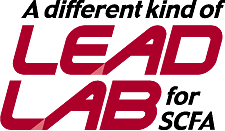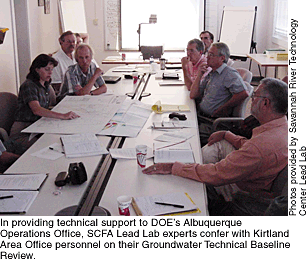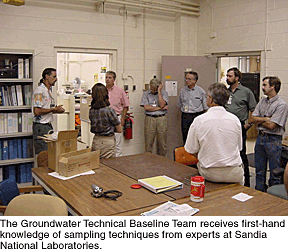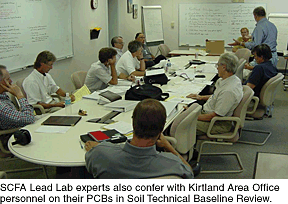
While the Savannah River Technology Center is the designated lead laboratory for the Subsurface Contaminants Focus Area (SCFA), the laboratory it leads is a virtual one, combining the expertise of the whole DOE complex into a network ready to support SCFA with strategic planning, technical reviews, multiyear program planning guidance, emerging issues, and special projects. But perhaps the most visible service and biggest value that the SCFA Lead Lab provides is technical assistance to DOE sites. The SCFA Lead Lab operates like a consulting firm in helping its clients—DOE facilities—access workable solutions for subsurface and groundwater problems from among an array of providers across the complex.
Deploying teams of experts
The first team focused on an approach to characterizing the extent of TCE contamination beneath the Burning Grounds and recommended a two-phase characterization effort to build and refine a conceptual model that describes TCE contamination in terms of size and distribution, potential TCE sources, vadose zone lithography, and specific pathways for TCE migration. A second team sent later to Pantex investigated the site’s southeastern portion of the plume, which is believed to have contributed to low concentrations of explosives reported in groundwater collected from two off-site Ogallala wells. The team recommended the use of innovative characterization and remediation approaches. Johnnie Guelker, assistant area manager of engineering at Pantex, is appreciative of the technical assistance the SCFA Lead Lab provided. “They helped us find a path forward for addressing the problem and also helped us regain public support. The team presented their findings and recommendations at public meetings, which helped us to better continue a dialogue with the neighbors and area citizens.” In another example of technical assistance, the SCFA Lead Lab in July 2000 responded to a request from DOE’s Albuquerque Operations Office for a technical baseline review of selected environmental restoration projects at Sandia National Laboratories. The Albuquerque Operations Office asked for the technical baseline review to help it consider various technology options prior to a rebaseline meeting planned for September. The experts the SCFA Lead Lab selected and sent to Albuquerque from eight DOE laboratories focused on technology options for treating soils with PCBs and tritium and strategies for characterizing and assessing groundwater and the vadose zone. George Rael, director of the Environmental Restoration Division at Albuquerque, is complimentary of the services provide by the SCFA Lead Lab, describing the team as professional. “They came in and worked long hours, through the weekend, and digested large volumes of data and information. They were able to deliver a highly credible document that has enhanced our ER projects.” Rael is also happy with the SCFA Lead Lab concept in “providing Albuquerque with top consultants from throughout the DOE complex to address our problems.” The SCFA Lead Lab’s visits to Pantex and Albuquerque, as well as to the Paducah Gaseous Diffusion Plant in Kentucky, have resulted in four reports, which are available on SCFA’s Web site at http://www.envnet.org/scfa/leadlab/products.asp:
|

 Tom Hicks, the technical lead for SCFA, describes this new arrangement as a “dispersed, partnering-lab concept. We have points of contact at each of the national labs who respond to requests for technical assistance and recommend knowledgeable scientists and engineers from their labs with the background to address pertinent technical issues.” In this scheme, the SCFA Lead Lab considers the experts and solutions that are put forward, selects the provider(s) from among the experts offered, and coordinates the transfer between provider(s) and requestor to minimize red tape and maximize value. As Jack Corey, SCFA Lead Lab coordinator, says, “We cull the best ideas from across the complex.” Corey says that the next evolution of this concept will be “to have people from the ER [environmental restoration] side of a site that has solved a problem consult with the site that has the problem. Then, we’ll be helping to transfer the operating aspects of a technology and not just recommending to a site that it try a certain technology.”
Tom Hicks, the technical lead for SCFA, describes this new arrangement as a “dispersed, partnering-lab concept. We have points of contact at each of the national labs who respond to requests for technical assistance and recommend knowledgeable scientists and engineers from their labs with the background to address pertinent technical issues.” In this scheme, the SCFA Lead Lab considers the experts and solutions that are put forward, selects the provider(s) from among the experts offered, and coordinates the transfer between provider(s) and requestor to minimize red tape and maximize value. As Jack Corey, SCFA Lead Lab coordinator, says, “We cull the best ideas from across the complex.” Corey says that the next evolution of this concept will be “to have people from the ER [environmental restoration] side of a site that has solved a problem consult with the site that has the problem. Then, we’ll be helping to transfer the operating aspects of a technology and not just recommending to a site that it try a certain technology.” In March 2000, Secretary of Energy Bill Richardson directed the SCFA Lead Lab to provide technical expertise to help DOE’s
In March 2000, Secretary of Energy Bill Richardson directed the SCFA Lead Lab to provide technical expertise to help DOE’s  Gearing up for more requests
Gearing up for more requests